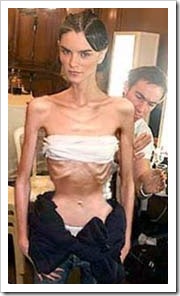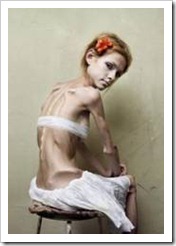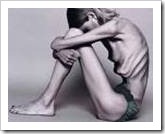
Be brave! Keep reading and look carefully at every photo, even though they are scary.
Skeletons
Having a child with Anorexia or any other eating disorder requires strong, brave parents who manage to help their child despite what others might say about them. The problem with Anorexia is that everyone can see it. Most kids do not do a very good job hiding it.
A couple of years ago, I worked with an anorexic woman who was 40 years old and weighed about 25kg (55lbs). Trust me, that was scary! It is not something you can hide very well. When I was in hospital with her, in the mental ward, there were other girls there and not all of them were teens. They looked like skeletons! But it is much harder to notice anorexia when it is developing and people often say, “She’s just a bit skinny, that’s all. She’ll get over it”.
Many people think they need to make the anorexic person eat more, but anorexia is a mental problem related to control and it does not go away when you eat more. In fact, taking over control and forcing a girl to eat might only make things worse.
The problem we have in our society is that most women and more and more men have some kind of eating disorder. The exposure to media that tells us how we need to look puts a lot of pressure on people’s self-esteem and mental stability. When someone starts showing signs of anorexia, we tend to ignore them by saying, “Everyone these days is dying to be thin”. I agree that everyone wants to be slim, but not everyone wants to die for it.

Spending a month there with my client, I felt that the joy, the smiles and the motivation were seeping out of me, fast. I was happy to go home in the evenings.
Yet, when I took the group of them, including one in a wheelchair, because she could not stand on her feet, to the nearby shopping center for supplies and lunch, they all behaved like little kids in a toy store. I spent the whole day trying to convince the ward it would be healthy for them to go out, see people, breathe fresh air and want things to buy, because wanting is a very important factor in healing, especially wanting to live. Sometimes I could swear the hospital was making it worse. If your daughter develops anorexia, you should do everything you can to make sure she is never hospitalized.
Much like in many health problems, early diagnosis is vital to good recovery. A person with anorexia will try to hide it, but if you establish good relationships with your kids and you see them getting dressed sometimes, it will be easy to notice that something has changed. Anorexia is a way to cope with a problem and it gives the person temporary relief. If you pay attention to your children’s physical and behavioral changes, you will notice that something is wrong easily and quickly. It may not mean your child is anorexic, but it is something you need to pay attention to. In Special Education, we say that we need to see enough “red lights” to confirm a diagnosis and I think this is also a wise way of reacting to anorexia. But when you see enough red lights, it is time to seek help.
Anorexia warning signs
Here is a list of anorexia warning signs. Since every person is different, they come in different combinations, but when you know your kids well, you will spot them.

- Skipping meals
- Fasting without medical guidance
- Swapping meals with fluids
- Avoiding particular foods for no health reason
- Taking vomiting tablets
- Taking laxatives – you can see they go to the toilet immediately after meals, so listen to check if they vomit too
- Sudden interest in “healthy eating”
- Not wanting to eat food they used to like
- Constantly claiming they have eaten already – it is OK from time to time, but when it becomes a habit, something is wrong
- Talking about food as “good” or “bad”
- Avoiding social gatherings where food is served or, if they have to go, saying, “I am allergic/sensitive to…” or “I have eaten already” when you know it is not true
- Excessive or compulsive exercise – some people love to exercise and there is nothing wrong with it, but being obsessive about it is not healthy. Obsession can be exercising no matter what or showing distress when not being able to exercise
- Being obsessed with diets – developing a sudden interest in weight-loss programs, websites and recipes, showing extreme interest in celebrities’ shapes and diets, eating slowly, eating with teaspoon and cutting food into tiny pieces
- Generally, obsessive behavior is a sign there is some disorder. When people insist on eating at a specific time, having the same rituals, drinking from a certain cup or sitting in a specific place, it is a sign of obsessive behavior. Eating disorders are obsessive behaviors related to food. Changes shake their world. Even if it does not seem major, pay attention and address it when it starts
- Avoiding social activities and not enjoying things they used to enjoy before
- Never being hungry

- Sudden weight loss or a change of clothing style to wearing big clothes and long sleeves so no one would notice the loss of weight. Look at their hands and legs. If you think they look like a skeleton, something might be wrong
- Feeling cold most of the time – a lack of nutrients affects our ability to keep ourselves warm
- Not having a regular period – it is very important for every mother to know when her daughter gets her period so that when something has changed, she will notice. Remember, reproduction is not vital. If your daughter wakes up in ten years and says, “Oh, I want to have kids now”, it may be too late
- Feeling tired most of the time and not being able to perform regular activities
- Fainting or feeling dizzy
- Lots of complaining about being overweight. It is good when kids complain about their problems, so you should be very happy when they complain, because you know what they are facing and you can help them. However, when the complaint seems unrealistic and does not stop no matter what you do, it is a bad sign
- Anxiety around mealtime and general moodiness and irritability – these are usually signs that something is bothering them and it is much like the complaining
- Expressing feelings of “out of control” – remember, eating disorders are actually control problems. It is your daughter’s way of gaining control over her life. Help her regain a sense of control. Give her choices, even create opportunities to choose and let her know she is in control of her life
- Expressing feelings of shame, unworthiness and guilt – generally, these are not healthy feelings. They may not be signs of anorexia, but it is one of those “red lights” that we need to pay attention to, particularly when others are “turned on”

Anorexia can develop from social triggers, chemical imbalances and other reasons, but so can other thing. If your child is showing the signs above, maybe they are developing anorexia and maybe not, but whatever the problem, early intervention is always better than having to convince a 40-year-old weighing 25kg to eat.
Be brave! Read the signs!
Happy and healthy parenting,
Ronit













